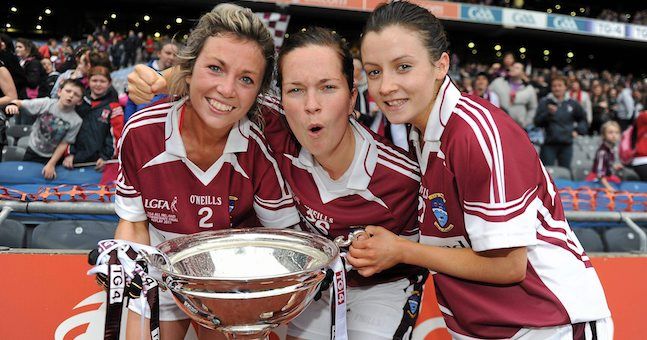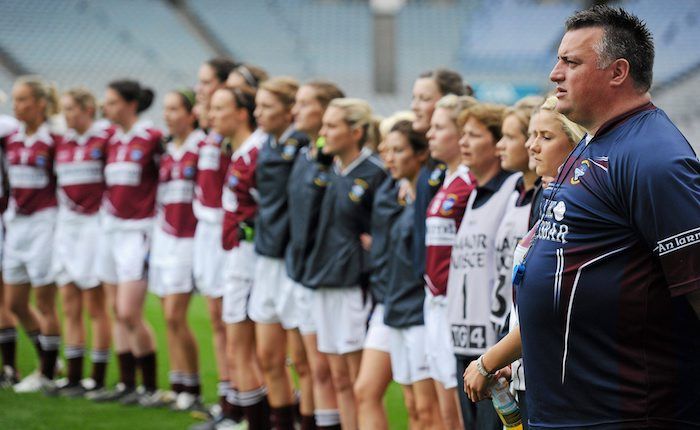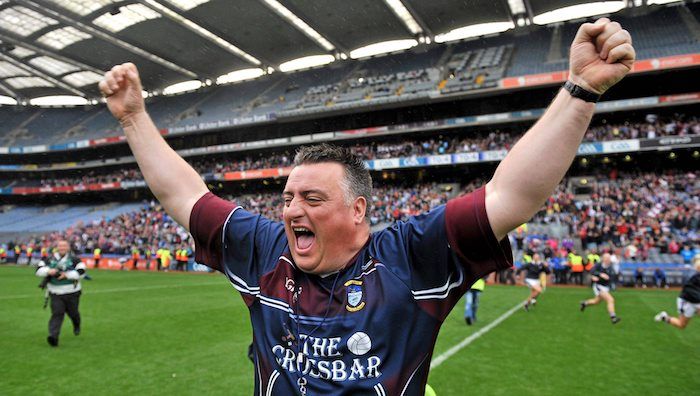

Share
21st September 2018
11:46am BST

 Put things into context first. This was a Westmeath team who were playing a relegation playoff in 2009, they were avoiding a drop to junior football by the skin of their noses and they were languishing in Division Four too.
Peter Leahy and Alan Mangan came on board in 2010 and things changed. Fast. In fact, it wasn't long until the group were being prodded into having the audacity to dream about Croke Park, even if it was wildly unbelievable from where they were sitting at that stage.
Put things into context first. This was a Westmeath team who were playing a relegation playoff in 2009, they were avoiding a drop to junior football by the skin of their noses and they were languishing in Division Four too.
Peter Leahy and Alan Mangan came on board in 2010 and things changed. Fast. In fact, it wasn't long until the group were being prodded into having the audacity to dream about Croke Park, even if it was wildly unbelievable from where they were sitting at that stage.
"I'll always remember back then, he had us all around the training pitch, he brought us in and said, 'girls, you will win an All-Ireland. You will win an All-Ireland,'" Newman remembers it like it was yesterday. "We had been so poor. We had never, ever challenged. We didn't even get out of the group stage. At the start, when he said it, I was thinking, 'ah no, is he for real?' "But he said this in 2010, he said it from the outset that we were going to win an All-Ireland and we didn't believe him until we started winning a few games."Sure enough, success started to follow the work they were doing and it would only take two seasons for them to completely transform from clingers-on to the best intermediate team in football.
 That didn't happen by chance. Peter Leahy wasn't in the right place at the right time.
The Westmeath view is that he was just the right man.
That didn't happen by chance. Peter Leahy wasn't in the right place at the right time.
The Westmeath view is that he was just the right man.
"When he came in, in 2010, he just changed things for us completely," Newman told SportsJOE. "We never had anyone like him in before. He just brought a professionalism into it, even back then. It's eight years ago and, in terms of inter-county ladies football, that's probably a long, long time. "He was the first to come in and give us gym programmes - like, we had free access to the gym, which was kind of unheard of. We had meals after training. We had training camps, not weekends but we'd go away for the day. We'd have meetings and he was the first to bring all that in."In a world where everyone has a platform, debates are very seldom debates anymore. It's one side against the other, one extreme forcing their agenda on another extreme doing the same thing and few actually meeting to thrash things out or consider other ways of looking at things. It's not that these people have a particular viewpoint, it's more that they're just supporters on one side now and they back their team through thick and thin, through right and wrong. The other problem with that though, as black argues white and both sets try to shout louder than the other, the only way to seem reasonable now is to assume that the truth must lie somewhere in the middle, no matter where the truth actually lies. When one argument says black and the next says white, the considered and rational will only look at the grey even when, sometimes, grey might be wrong. In the case of the Mayo footballers, the happy medium reached was to agree that the 12 players who left the panel were in the wrong to use loaded phrases about Peter Leahy's management team but to assume that he must be a shit a manager too. The rationale was that, okay, he's a shit manager, but claiming the environment was unsafe is over the top. That was the best mediation that could be reached because, whoever was right or wrong, there was still a set of players who were genuinely upset by something. So the solution offered was for both parties to take some blame - Leahy for the way he apparently spoke to people, for what he expected of them and, yes, for having an outdated management style. In the rush to be fair and balanced, there were a lot of harsh assumptions made about the type of manager Peter Leahy was. The reality is that the majority of the players in Mayo hung around to continue playing under him, Sarah Rowe spoke glowingly about the coaching setup in August, the remaining squad released a statement as a group backing Leahy and then the Mayo board threw out the Carnacon-plus-four grievances as mere player-management issues and they offered him the role again in 2019. The other reality is that Leahy was brought in as coach last year and helped Mayo to the All-Ireland final. He took over in 2018 and got Mayo sans Cora Staunton to a league final and got a hell of a lot closer to Dublin too. And he's had other success in his career too - like winning an All-Ireland.
 That's why, in Westmeath, Laura Newman can't agree with the new assessment that the only thing Leahy was guilty of was being a bad manager.
That's why, in Westmeath, Laura Newman can't agree with the new assessment that the only thing Leahy was guilty of was being a bad manager.
"For us, he was a brilliant manager," she said. "He was fantastic. He changed our fortunes completely. We were Division Four and now we're Division One and I think it all comes from playing senior football and winning that intermediate. "I don't know what's going on in Mayo but, for us anyway, he had a fantastic management style. He's been called authoritarian but I definitely didn't get that - in fact, it was kind of like the opposite where he brought this professional setup in and he could delegate out to selectors. It was more like a team management rather than just him."Individual feedback sessions Up in the Bloomfield House Hotel in Mulligar, Newman would experience those much-debated individual feedback sessions of Peter Leahy. There, she was told straight why she wasn't making the team.
"We had a training camp for the day and we trained that morning and he had the room set up afterwards. I mean, this was huge for us, we were coming from nowhere really. No disrespect to other managers but he just brought something different into it. So he had these one-on-ones and he'd just tell it how it was. "This is coming from me, I didn't really get much championship game time under him. I used to start a bit but I didn't under him. So he'd say, 'you're not going to be playing unless you do this...' "I was fast but I wasn't fit and he was looking for fitness, that's what he wanted. He was saying, 'listen, you need to get fitter.' Like, I wasn't happy, I wanted to play but you took it on board. "As a player, you want your place or you're not going to be happy but, looking back, I couldn't say there was anything bad about the one-on-ones. They were always just for feedback really."For Leahy's two years in charge, Newman was frustrated at the championship game time she was getting but she kept working and kept wanting to impress him. It was Leahy who turned her from a wing back into a corner forward where she'd continue to play from that point. He had a big impact on her career but a bigger one on Westmeath.
"He just had that thing where you wanted to play for him and you wanted to do well for them. Don't get me wrong, I wasn't happy at all about not getting my own place but I can still appreciate what he did. "He took risks. He dropped a few girls, he brought a few girls in and you'd sometimes be wondering what he was doing but it did pay off in the end. "We weren't expected to win an All-Ireland - I couldn't see when something like that would ever happen - but he managed to do it in two years."Fitness training Part of Sarah Tierney's interview heard the Mayo captain describe an incident where she questioned the amount of running they were doing in a session before recommending that the team get a different coach on board to help the defenders. At Westmeath, they weren't spared the fitness work either which Leahy headed up and, alongside senior men's football star Alan Mangan, they got the blend right of football and conditioning.
"There were some sessions organised and we knew what was coming, we absolutely dreaded them," the St. Loman's native said. "We used to train a good bit in Mullingar Rugby Club and Harbour Pitch in Mullingar and you just knew what was ahead of you. But he did what he had to do. He had to have a certain level of fitness. "His training regime was so, so tough. So tough. One of the toughest I've ever experienced but that's why we got to where we got to back then and why we are where we are now."And, years later, it's 2010 and 2011 that sticks out for Newman.
"If I was to look back and think what setup was best, we had great managers but he stands out. "Yes, because we won the All-Ireland but he just brought in things that we never had before, like the free gym and meals and he gave us a calendar for the year with every training session and every game set out. I appreciate that maybe these things are run of the mill now in an inter-county setup but, back then, they weren't. It just gave you a sense of 'God, we're going somewhere here.' "He was the best manager I've seen who was able to get the best out of everyone. "He was definitely one of the best managers I've ever played under."
Explore more on these topics: